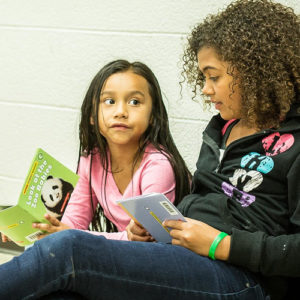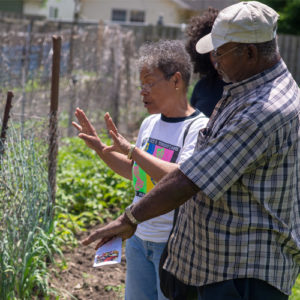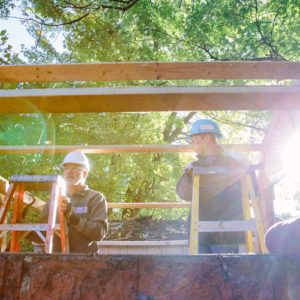In 2019, Central Indiana Community Foundation, The Indianapolis Foundation and Hamilton County Community Foundation launched bold strategic plans for Marion and Hamilton counties—and then went to work to create communities where all individuals have equitable opportunity to reach their full potential—no matter place, race or identity.
Thank you for the partnership of our angel investors, without which, progress would not be possible.
Marion County
- FAMILY STABILIZATION – Housing to Recovery Fund
 In January 2019, Central Indiana Community Foundation joined Mayor Hogsett and the City of Indianapolis to announce the Housing to Recovery Fund and a shared goal to end homelessness in Indianapolis by 2023. The fund brings together government, philanthropic organizations and service providers to invest in sustainable solutions that support the pipeline to housing.
In January 2019, Central Indiana Community Foundation joined Mayor Hogsett and the City of Indianapolis to announce the Housing to Recovery Fund and a shared goal to end homelessness in Indianapolis by 2023. The fund brings together government, philanthropic organizations and service providers to invest in sustainable solutions that support the pipeline to housing.Employing a “pay-for-success” model ensures those in crisis are immediately housed and connected to the care they need.
Grants awarded from the fund will help organizations build capacity to efficiently and effectively deliver wraparound services to chronically homeless individuals and families who have been connected to housing.
Since the initial announcement, a request for qualifications has been issued, service providers chosen, and a new delivery model is being developed. To date, the fund has raised $1.9 million of its $4 million goal and expects to award its first grants by June 30, 2020.
- FAMILY STABILIZATION – Personal Mobility Network
The CICF Personal Mobility Network worked with IndyGo to sponsor the Ford Motor Company’s City:One Challenge, which solicits ideas from residents to create affordable, accessible and equitable mobility solutions. Indianapolis was one of four cities chosen for the 6-month challenge. In November, two ideas were selected to pilot in 2020 through the challenge; 120 ideas were submitted from across the country.
AbleLink Smart Living Technologies received $75,000 to pilot a program that utilizes the WayFinder Ecosystem to enhance transportation for individuals with cognitive disabilities. The program will utilize GPS and personalized visual, audio and vibration prompts to help individuals with cognitive disabilities independently navigate fixed-route, public transportation.
The Learning Tree, a local not-for-profit organization, received a $50,000 to pilot “Knowledge = The Power of Mobility.” The organization will work with traditional and nontraditional transportation providers to collect baseline data to assess the challenge of accessing transportation to cultural and recreational activities for people living in low-income communities in Indianapolis. Data will be used to increase knowledge and visibility of existing transportation options and create more mobility options.
Two additional ideas will be piloted with supplemental funding from IndyGo in partnership with CICF.
First, MLK Center will develop a neighborhood-based microtransit service utilizing wheelchair accessible and family-friendly vehicles to connect Midtown residents to jobs, school, health care, and first/last mile connections to fixed transit routes.
Second, Briometrix will pilot “City on Wheels,” which digitally maps and assesses the health and integrity of 61 miles of sidewalk infrastructure along the Red Line bus rapid transit and employ residents who use wheelchairs. The data will inform future infrastructure as well.
- ECONOMIC MOBILITY – Opportunity Youth Collaborative
The first Opportunity Youth Collaborative in the region launched this summer with a $400,000 investment from the Community Leadership Innovation Fund, a fund of CICF. The initiative convenes organizations working to reengage young people, ages 16-24, who are not employed or enrolled—identified as “opportunity youth.”
Participants include Groundwork Indy, Hamilton County Youth Assistance Program, MLK Center, Indiana Black Expo, EmployIndy, CAFÉ and Boys & Girls Clubs of Indianapolis. Engagement programs for opportunity youth are relatively new, and each program takes a different approach. The goal of the collaborative is to meet regularly and exchange learnings, enhance partnerships, leverage resources and optimize programs for better outcomes. Additionally, CICF is funding technical support to the collaborative to develop shared and measurable outcomes.
Opportunity youth became the priority focus for the Community Leadership Innovation Fund advisors in 2019 upon evaluating and understanding that this demographic is disproportionately people of color and from low-income neighborhoods. Advisors also expressed concern for the long-term impact on individuals, families and the community when 30,000 youth are not engaged in systems that promote educational or economic success.
Advisors for the Community Leadership Innovation Fund include five philanthropic leaders—Lori Efroymson-Aguilera, Marianne Glick, Myrta Pulliam, Cindy Simon Skjodt, Charlie Sutphin— and three foundations—CICF, represented by Greg Hahn; The Indianapolis Foundation, represented by Milt Thompson; and Hamilton County Community Foundation, represented by Jay Merrell.
- CRIMINAL JUSTICE REFORM – Bail Project launches in Indianapolis
Earlier this year, CICF helped seed the funding for an Indianapolis office of The Bail Project, a national organization that combats mass incarceration by disrupting the money bail system. At any given time, the Marion County Jail incarcerates about 2,400 people, 84% of whom are held pretrial. Inability to afford bail exclusively impacts low-income communities and disproportionately impacts women and people of color. The impact of even a few days in jail is significant and long-term.
The Bail Project launched in Indianapolis in January of 2019 and within the first five months, the local team bailed out over 150 people. In Indianapolis, the results imitate those of the 10- year period in New York where 95.6% of The Bail Project clients did not return to jail—48% had their charges dismissed outright and the other 48% had their charges resolved with non-incarceratory sentences. Of the 23 clients in Indianapolis with closed cases, only one served a jail sentence of 20 days. While the average bail amount for these cases was set at $1,392, the median was $500.
Cash bail is returned to defendants appearing at required court date(s), whether guilty or not. As a result, The Bail Project can recycle cash bail multiple times throughout the year, compounding its impact and sustaining the fund. The Bail Project employs local, individuals with experience in the criminal justice system who support clients with court date reminders and other community-based, wraparound services.
The organization estimates needing to raise $125,000-$275,000 every year for the next five years to sustain local operations and build capacity to assist 600 people annually.
- NEIGHBORHOOD EMPOWERMENT AND PLACEMAKING – Deepening resident relationships
 After an initial information gathering project in 2017-2018 with 36 community ambassadors, CICF now partners with six focused community ambassadors in specific under-appreciated neighborhoods with opportunity to grow over time. Ambassadors are highly valued and significantly influence the grant-making process and leadership decisions at the foundation. As a result, CICF is building deep relationships with residents, supporting community-based assets and providing resources to neighborhoods for community-driven projects.
After an initial information gathering project in 2017-2018 with 36 community ambassadors, CICF now partners with six focused community ambassadors in specific under-appreciated neighborhoods with opportunity to grow over time. Ambassadors are highly valued and significantly influence the grant-making process and leadership decisions at the foundation. As a result, CICF is building deep relationships with residents, supporting community-based assets and providing resources to neighborhoods for community-driven projects.Community ambassadors created their own guiding principles and vision earlier this year: (1) maintain integrity while connecting human relationships above all else; (2) actively listen to discover human assets; (3) seek invention, thinking beyond the norms while taking risks; (4) equity— advocate for equitable access and distribution of resources, for money that will flow to the people who need it, and for sharing social capital; (5) all action should be done alongside the community– with the community, not to the community.
These principles are in service of a vision to connect under-appreciated communities with needed resources and social capital through advocacy, urgency and equity.
Staff have called upon and partnered with ambassadors on a variety of projects, including the incubation and launch of a community art ambassador program, transportation accessibility, equitable development, and most importantly, relationship building. Ambassador relationships continue to advance the foundation’s engagement with residents and has stimulated creative solutions to support neighborhoods outside of traditional grant-making. Ambassadors have access to CICF offices and staff for their work, which drives further foundation influence.
- DISMANTLING INSTITUTIONAL RACISM – Internal and external influences
CICF is committed to becoming a fully inclusive, anti-racist, multicultural organization. Foundation efforts to dismantle systemic racism have largely focused on changes to internal operations, learning and becoming more embedded in the communities served. For example, the foundation is implementing a new process for grant application, review and reporting. These changes support more equitable grant distribution and utilize inclusive language. A similar restructure was also applied to scholarship applications and review committees. Spanish and Burmese translations for application instructions were also added this year.
Additionally, CICF is conducting blind job applicant material reviews for every position and diversifying our outreach strategy for applicants. To continue learning, staff has participated in yearlong, in-depth discussions about content from the podcast series “Seeing White,” from Scene on Radio, and the book “White Fragility,” by Robin DiAngelo. As a result of staff talking about these resources in the community, CICF is hosting two additional podcast conversations for external stakeholders.
CICF has also focused on creating new, meaningful and reciprocal relationships and partnerships with people of color in the community in a variety of ways, including establishing the foundation’s first Opportunity, Equity and Inclusion Advisory Council and partnering with the African American Legacy Fund of Indianapolis, community ambassadors and black-led not-for-profit organizations, including significant influence and leadership from two grassroots organizations, Kheprw Institute and The Learning Tree.
CICF’s Professional Advisor Leadership Council (PALC)—a group of wealth advisors, estate planning attorneys and accountants—has intentionally expanded outreach to invite a more diverse membership and expand the foundation’s network with professional advisors, who refer most fund holders. And, for the first time, CICF has eliminated the minimum fund requirement for donor-advised funds. The foundation seeks to partner with any philanthropically minded individual, family or company and believes removing a $25,000 minimum will increase the accessibility of our foundation.
CICF’s mission has had external influence as well. Indianapolis mayor, Joe Hogsett, has adopted the word “under-appreciated,” to describe neighborhoods, a phrase coined by community ambassadors; Vop Osili, City-County Council president refers to race, place and identity in service to our community; and Michael Huber, president and CEO of the Indy Chamber, says the organization has become more intentional.
“Over the past three years, the Indy Chamber has shifted its fundamental strategy as a business organization toward inclusive policies and practices to address the alarming economic and racial income and equity disparities in our region.
Through our research with the Brookings Institution and collaborations with partners like CICF, we are much more focused on factors that limit economic mobility in our community, especially in low-income communities. While no single solution exists, it has intensified our efforts on education and workforce development, mass transit expansion and workforce mobility, entrepreneurship, and more equitable economic development policies. Closing economic and racial gaps is not only the right thing to do, but also in the best long-term interest of the business community.”
—Michael Huber
Hamilton County
- MENTAL HEALTH – A web of support
The City of Westfield says 17% of sixth-grade students at Westfield Intermediate School have reported feeling sad or hopeless for two consecutive weeks and an additional 7% reported they had considered suicide. In an effort to create an overall healthier community, the Wellbeing Coalition of Westfield was established in January in partnership with Hamilton County Community Foundation, Westfield Washington Schools, the City of Westfield and others.
Wellbeing Coalition of Westfield addresses mental, physical, social, emotional and spiritual issues in Westfield by expanding community resources and training opportunities. In June the coalition announced its 2019-2020 strategic plan and key projects, including the development of a wellbeing index, training for first responders, a website with resources and community events and fundraising for sustainability.
The coalition will produce a blueprint model for community wellbeing that can be expanded upon in other Hamilton County communities.
-
FAMILY AND YOUTH EMPOWERMENT – Collaborating to better serve seniors
In 2017, Shepherd’s Center of Hamilton County launched a new program, Reaching Resources, to connect seniors to the help they need, with one call to one place. The program received initial seed funding from Hamilton County Community Foundation. Reaching Resources initially launched with one coordinator in Sheridan and has expanded to add two additional coordinators for the county. As a result, the program has connected more than 380 seniors to resources.Reaching Resources solves for inefficiencies countywide by aggregating up-to-date and accurate information about programs from senior-serving agencies throughout Hamilton County and thereby streamlining the process for those in need to receive help.
An example of this collaborative, countywide effort is in the home repair partnership between Shepherd’s Center of Hamilton County and Hamilton County Area Neighborhood Development (HAND). Through this partnership, low- and moderate-income homeowners receive critical home repairs or modifications. HAND processes applications from homeowners, maintains and manages the wait list and manages the overall project logistics while Shepherd’s Center is responsible for referrals, project software, leveraging volunteers and providing access to discounts for material and supplies.
-
INCLUSIVE ECONOMIC GROWTH – Future of Work lab at Ivy Tech
 Hamilton County Community Foundation awarded a 2-year grant, totaling $75,000, to Ivy Tech Community College Hamilton County for its Future of Work lab, in partnership with the Hamilton County Workforce Innovation Network (HCWIN). The Future of Work project will begin in 2020 and will focus on targeting populations with limited access to current and emerging technologies while also creating a talent pipeline for the future workforce.
Hamilton County Community Foundation awarded a 2-year grant, totaling $75,000, to Ivy Tech Community College Hamilton County for its Future of Work lab, in partnership with the Hamilton County Workforce Innovation Network (HCWIN). The Future of Work project will begin in 2020 and will focus on targeting populations with limited access to current and emerging technologies while also creating a talent pipeline for the future workforce.The Department of Workforce Development occupational demand data for Hamilton County shows professional services/information technology as a priority economic growth sector, with an estimated 37% employment growth from 2016-2026. Ivy Tech is working with the New America Foundation’s Shiftlabs initiative to produce a study of occupation changes resulting from technologies such as digital media, cybersecurity, virtual-augmented reality, artificial intelligence, machine learning and robotics. Ivy Tech plans to use this data to explore training opportunities for these technologies.
The Future of Work lab is a central location providing state-of-the-art workforce training for students entering the workforce and adults who seek retraining. Ivy Tech Hamilton County is the only location in Indiana where all workforce training services—high school career and technical education programs, adult basic education, Excel Center Adult High School, WorkOne full-service office, and Ivy Tech workforce training programs— are located in the same facility.






Leave A Comment